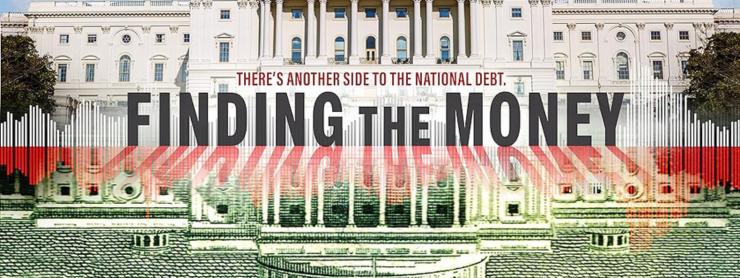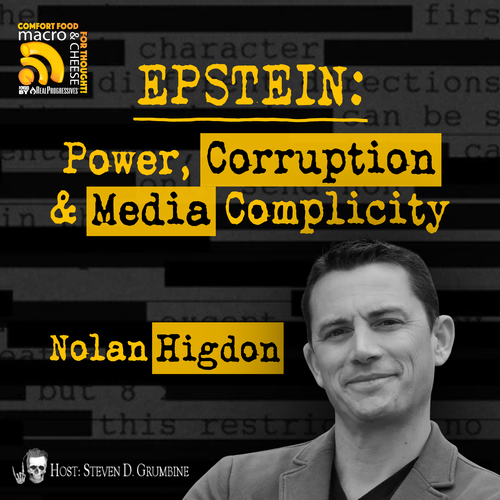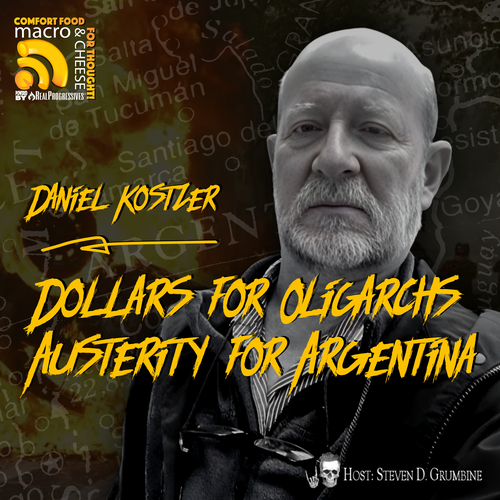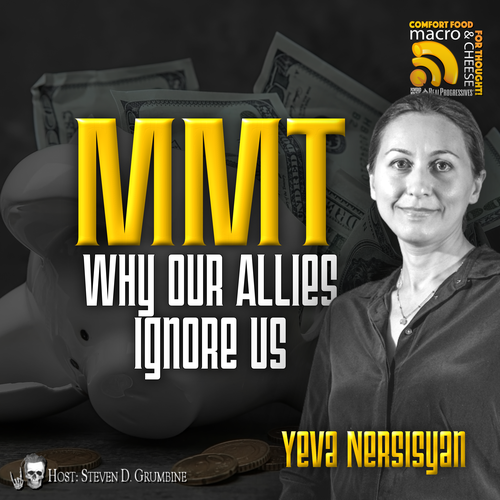Episode 322 – Eggsploitation with Basel Musharbash
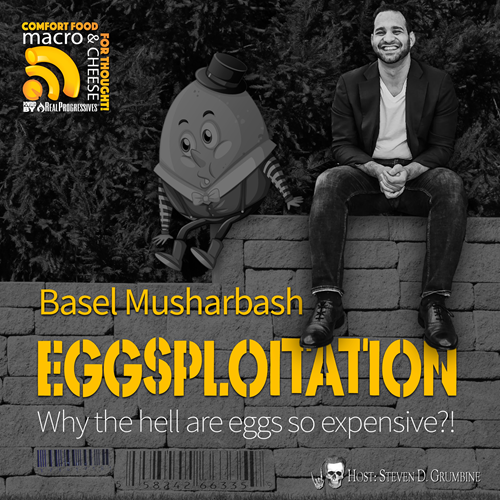
FOLLOW THE SHOW
Which came first, the price or the egg? Basel Musharbash, an antitrust and trade regulation attorney, paints a picture of the powerful monopolies controlling and manipulating the egg market.
Crazy things have been going on with the price of eggs, especially in the US. If you think this is happening because of the avian flu, you’ve been hoodwinked. Again.
Basel Musharbash, an antitrust and trade regulation attorney, joins Steve to pull back the curtain on the monopoly forces within the egg supply chain. The discussion reveals crucial and surprising information about this, um, bread and butter issue.
The episode explores the role of avian flu and how it has been weaponized by a few corporations to tighten their stranglehold on the market. With just three companies controlling crucial choke points in the egg supply chain, Basel explains how these oligopolies are not merely reacting to external pressures but are actively manipulating supply.
Steve and Basel also look at the historical context of antitrust laws and how their erosion has led to the current monopolist landscape.
Once again, consumers are getting screwed by an industry whose structure is designed to do just that.
Basel Musharbash is an antitrust and trade regulation lawyer with a focus on building stronger rural economies. He represents family farmers, small businesses, and local governments (as well as groups working on their behalf) in regulatory advocacy and impact litigation aimed at righting the wrongs of concentrated corporate power in rural America — and building a free and fair economy for all.
His work has been covered in or on Reuters, AP, Time Magazine, CNBC, The Today Show, Politico, The American Prospect, DTN-PF, Daily Yonder, and other media outlets.
@musharbash_b on Twitter
Steve Grumbine:
All right, folks, this is Steve with Macro N Cheese.
I watched the egg prices bouncing all over the place and watching folks getting all excited about it and they were ready to have an election over egg prices. Lo and behold, we had an election over egg prices and egg prices are still going up. What the heck, you know, right?
So I started digging in and sure enough, we found a guy who wrote on Matt Stoller’s Big Substack, which is a great Substack if you get a chance. An anti- monopoly Substack worth checking out.
But there was a gentleman named Basel Musharbash who wrote this excellent three piece write up on the egg conspiracy. And “Hatching a Conspiracy” is what it’s called. It’s really, really worth your time. So I’ve got Basel joining me today. And so a little bit about Basel.
Basel’s an antitrust and trade regulation attorney, anti-monopoly counselor.
He represents farmers, consumers, workers, small business and litigation and policy advocacy aimed at remedying the harm of concentrated corporate power. And who isn’t here to eliminate corporate power, at least a monopoly on it, right? I think this is a great topic.
I think it’s something that everybody has a “stake” or an egg in. And without further ado, I bring on my guest, Basel. Welcome to the show, sir.
Basel Musharbash:
Thank you so much. I’m glad to be here. Thanks for having me.
Steve Grumbine:
Absolutely. So obviously this is a big deal and it’s a lot more than just going into the store and seeing egg prices are high. This is a monopoly story, isn’t it?
This is an antitrust type story. There’s a lot of stuff going on here. Can you kind of set the stage for what we’re dealing with?
Basel Musharbash:
Absolutely, Steve. I think we do have a problem with avian flu. It’s a real thing that’s happening, obviously.
But I think the situation with avian flu is being exploited by a handful of corporations that have taken over the egg supply chain and are using it in order to extract higher prices from us, to subject us to shortages that enable them to exercise market power and reap higher profits.
So to set the stage for you, the basic story that we’re facing is one where three companies have secured choke points at critical points in the egg supply chain. So you have to understand the supply chain…
The basic structure is a handful of companies have taken over certain choke points in the egg supply chain and are using those choke points in order to throttle the supply of eggs, keep it at shortage or near shortage so that they can charge higher prices and reap bigger profits. On one end of the egg supply chain, you have the folks who breed the egg laying hens. You need a hen in order to get an egg right?
And right now, one German company called the EW Group controls about 70% of the supply of hens to American egg producers. Another Dutch company called Hendrix Genetics controls the last 20 or 30% of the supply of hens to American egg producers.
That gives them the power to throttle the supply of hens to egg producers in a time like this one, where they’re losing hens to avian flu, with the goal of keeping the egg supply throttled, keeping it down a little bit so that the price of eggs stays high, which in turn keeps the price of hens high. And there’s evidence that they’re doing that. So that’s one part of the story is in a choke point on the supply of hens.
On the other end of the egg supply chain, you have the egg producers. And among the egg producers, there is one company that’s particularly dominant. It’s called Cal-Maine Foods. It produces about 20% of America’s eggs.
But that’s not the only source of power for this company. The other source of power is that Cal-Maine Foods is sort of like the Saudi Arabia of eggs.
It has a range of tools at its disposal to discipline any other egg producer, any smaller egg producer that gets out of line tries to produce too many eggs in response to the high price of eggs, which in turn could bring the price of eggs down too much.
So Cal-Maine Foods can sort of act as, like the Nurse Ratched that walks around the egg industry and makes sure that egg producers don’t go too crazy with producing eggs, don’t oversupply the market, so that the price of eggs stays high for everybody, for all the egg producers. So that’s the situation we’re dealing with. That’s the basic story. And the upshot is that we end up paying higher egg prices.
We end up dealing with a throttled supply of eggs that’s far more susceptible to these kinds of disruptions from things like the avian flu that we’ve seen over the last few years.
Steve Grumbine:
You know, it’s interesting because during the COVID pandemic, we saw companies who took signals from industry and leveraged those signals from industry to ratchet profits up to a thousand percent at times. And economists such as Isabella Weber [yes] who really put the spotlight on sellers’ inflation, AKA greedflation, okay, really laid it out in spades.
But what you just did for me anyway, you are perfect analysis of calling it like Saudi Arabia.
I mean you can look back to the OPEC Crisis in the 70s and watch how they played games with the price of barrels of oil and watch how they reduced the output to discipline other producers of oil that might have changed the forward pricing models that they were employing. And lo and behold, you have fuel lines with people with odd even license plates. And you know, I mean, I lived through that nonsense. It was insane.
But you’re watching the same thing here.
And I think the problem with this that makes it so important is most people, when you think about poverty and you think about what regular people when they don’t have a lot of money will eat, how they can get by is eggs.
Basel Musharbash:
Right?
Steve Grumbine:
Eggs have always been kind of a, a quick staple of protein, good nutrients and relatively easy to prepare. And you can make massive amounts of scrambled eggs to feed a large number of people. And now all of a sudden that is becoming a problem.
And it may not be a problem for your professional-managerial class [PMC] type people who have more money to spend.
Basel Musharbash:
Right.
Steve Grumbine:
They probably don’t like it. But when you think about the impact of staples for people that are food insecure, this is a real problem.
Basel Musharbash:
Absolutely, absolutely. And it’s worth thinking about the system that gave us affordable, plentiful eggs throughout the 20th century.
There’s a reason that eggs became this huge part of Americana from the 1950s onward with like the diner becoming such a fixture of American culture. And the system that was behind that had three pillars.
On the one hand you had antitrust laws and regulations which, without getting into the nitty-gritty details, basically what they did is made it so that it’s hard for a company that’s a large egg producer, for example, it was hard for them to just buy out all of the largest egg producers, combine them together to make a dominant company.
The antitrust laws also made it hard for say the hen breeders to merge with each other so that there’s one company that controls 70% of the supply of hens. That was basically illegal under the antitrust regime of the mid-century era.
And that was a critical reason why we had this open competitive egg industry. That because it was competitive, because it was filled with small producers whenever the prices went up, all the small producers rushed to produce more eggs to try to take advantage of the high price before it inevitably went back down as everybody rushed to produce eggs. That used to happen pretty regularly and it doesn’t now because of the concentration of economic power.
But beyond the antitrust laws, I do also want to mention, I think especially on the podcast about MMT and stuff, is the role of government in promoting better, more plentiful egg production.
One of the critical things that made egg production so much more productive is that in the 1940s we developed a way to cross breed different breeds of chicken in order to produce like a super chicken that lays more eggs, uses fewer resources, is more adapted to certain production systems. But we didn’t let one company just bottle up those breeding methods and prevent anybody else from using them or improving on them.
No, the USDA [United State Department of Agriculture] made those breeding methods and know how widely available throughout the country to small breeders. And even more importantly, it made something else available, which is breeding stocks.
It made the stocks of chicken that you need in order to cross breed and try to produce the super chicken available to small breeders. And so you had this vibrant industry with dozens of breeders competing against each other to breed better hens for egg producers.
And that was the status quo that stayed with us until the 1980s, until these programs that made breeding know how and breeding stocks available were eliminated, and until the antitrust laws and regulations were taken away as part of the Reagan revolution and subsequently as part of the Clinton administration as well. So that’s the background to all of this, is that we had a system in place to make eggs affordable and plentiful. It didn’t just happen on its own.
And we’ve sort of systematically taken it away since the 1980s and 1990s.
Steve Grumbine:
This is a real indictment of Ayn Rand “might makes right” kind of belief systems. This is that whole libertarian logic here. Ultimately, corporations have a natural tendency toward monopolies.
If you don’t have an active anti-monopoly component to your government, this is going to be what happens. And you don’t have to look far. You can look at Monsanto and their seed monopolies. This seems like almost the exact same model that Monsanto deploys.
Am I missing something there?
Basel Musharbash:
Yeah, it’s more or less the same model. Yeah, there are tiny differences. Monsanto can use patents in a way that these livestock genetics barons can’t, but they do the same thing.
Basically EW Group and Hendrix Genetics, they’ve bought up all of the breeders that used to compete against them in egg-laying hens. They cornered the supply of breeding stocks which any competitor would need in order to breed a new hen that competes against EW Group and Hendrix.
And they’ve, you know, used a range of IP [intellectual property] and other trade secret protections and other sort of tools in order to basically set up a wall around all the know-how and all the methods and all the information that a company would need in order to become an effective competitor in the breeding of egg-laying hens. So yeah, it’s very similar to what Monsanto has done, really, just in a smaller market.
Steve Grumbine:
You know, when I think about some of the problems we see globally, we see the Global South, who has lots of people, lots of natural resources, but they lack the IP that has been monopolized, if you will, by the Global North and just everything from medicines, I mean lifesaving medications. They use the same exact formula to keep these folks completely away from solutions to actual life-and-death problems.
Basel Musharbash:
Right.
Steve Grumbine:
And lo and behold, in the name of the free market, in the name of private property, in the name of, basically, capitalism, they find excuses throughout the entire process to manipulate and control this. And our government is literally the enabler. It is not a disaffected arbiter of protecting the consumer.
It is so deeply in bed with these corporations that instead of protecting, it actually is facilitating. What are your thoughts on that?
It seems like there’s never been a time greater than now with a need for anti-monopoly legislation or just an overall anti-monopoly, trust-busting style government. We do not have that, do we?
Basel Musharbash:
Yeah, we don’t right now. I don’t know that we do right now.
I think there’s a sort of an intellectual revolution underway towards where we’re starting to recognize that we do need anti-monopoly laws and we need to enforce them.
And there’s a growing recognition that a handful of corporations are wielding outsized power over our economy and the supply of the things that we need.
You know something that I was involved in last year is I wrote a report for a group called Farm Action called Kings Over The Necessaries of Life that looked at monopolization and the elimination of competition throughout the agricultural supply chain in the United States.
And what we basically found was that essentially three dozen corporations exercised tremendous power over who gets to farm and how they farm in this country, what food gets produced and sold and how much we all have to pay for it.
Those three dozen companies essentially centrally plan our agricultural supply chain because of the economic power that they’ve consolidated over every industry that’s involved in producing, processing and distributing food in this country. And I call that the Sovietization of American business. You know, it’s sort of like we’re dealing with central planning.
It’s just that it’s not central planning by a bureaucracy in Washington, D.C., and folks can have different opinions on how good of an idea that is, but we’re facing central planning by a bureaucracy that sits, you know, at least in the context of eggs, it’s a corporate bureaucracy that sits in Cuxhaven, Germany, and Boxmeer, Netherlands, and in Jackson, Mississippi, in the case of Cal-Maine Foods.
Those folks are deciding how our egg supply will fluctuate. But they’re not making those decisions in the public interest.
They’re making those decisions in the interests of their shareholders and their investors, and usually at the expense of the rest of us.
And the question that we face today is whether we’re going to accept that kind of central planning or whether we’re going to use the tools that we’ve historically used, the antitrust laws, to rid ourselves of these kinds of autocrats of trade and restore the freedom of enterprise and economic liberty to our society.
Steve Grumbine:
You know, when I think about private property, right? Private property is the absolute tip of the spear for everything, right?
It is the core fight going back to the dawn of this colonial project we call the US and it’s been this way around the world. Like, who owns the means of production, who controls the means of production, and whose interests are we serving?
You know, I have an MBA and the idea of maximizing shareholder value is a core principle of all capitalist business in this country. And it seems like it’s becoming that way around the world. The US has kind of exported its neoliberal project everywhere.
But with the consolidation of businesses and this kind of globalization, the blurring of lines between who’s got control and whose interests are being served and so forth is very, very much blurred, probably intentionally so, with these conglomerates, these international conglomerates. I’m curious.
Obviously, you said these companies are kind of cracking the whip and making sure no one steps out of line to ensure the monopoly stays intact. But what are some of the tactics they use to discipline these smaller groups?
Basel Musharbash:
Sure. We can start answering that question with the hen breeders, EW Group, and Hendrix Genetics, and then go to Cal-Maine Foods.
So if you think about it in a context where an avian flu epidemic is resulting in egg producers culling tens of millions of birds, what you would think would happen is that there would be an increased demand for hens, which would incentivize the hen breeders to expand the pipeline of hens, right?
You would expect them to put more, it’s called parent hens in place to lay more fertilized eggs so that they could produce more production hens to sell to egg producers who now need not just enough hens to replace the birds that are aging out, but also to replace tens of millions of birds being lost to avian flu. That’s what you would expect to happen in a functioning market, let’s say. But that’s not what the hen breeders have been doing since 2022.
You know, we looked through the USDA data on this stuff, and we found that, for example, the hen breeders reduced the total number of parent hens that they have from 2.9 million in 2021 to 2.5, 2.4 million over the last two years since 2022. That’s strange.
We’ve also seen them basically keep the number of fertilized eggs that they incubate and hatch, keep it basically steady, and instead of increasing it rapidly.
And what that does in the context of an avian flu epidemic is it slows down the recovery of egg producers from avian flu outbreaks, forces the total number of hens producing eggs for America to go down, which in turn keeps the price of eggs slightly higher, or actually a lot higher than it otherwise would be, which in turn lets the hen breeders charge more for their hens. But no one gets mad about that because everybody’s making more money.
The egg producers are making more money, the hen producers are making more money.
So that’s been the primary sort of tool that the hen breeders have used in order to, like, hem egg producers in and make sure that they don’t go overboard with expanding production in a way that will bring egg prices down. So that’s one part of the story, the hen breeders and their throttling of the parent flocks. The other part of the story is Cal-Maine.
And the thing about Cal-Maine, I mentioned earlier that it’s like the Saudi Arabia of eggs. And the reason I said that is because it has the same power to discipline egg producers as Saudi Arabia in oil markets.
So let’s think about that for a second. The reason Saudi Arabia is so important in global oil markets isn’t because it controls an overwhelming share of the supply of oil at any given time.
Saudi Arabia produces something like 10 to 15% of the global oil supply at any given time. What makes Saudi Arabia so powerful is that it can ratchet up its production faster and cheaper than anybody else can.
And so if Saudi Arabia wants to, it can flood the global oil markets with oil, it can increase the supply of oil by 5, 10% pretty quickly, which will drive down the price of oil for everybody else, while Saudi Arabia captures more market share. Now, why would Saudi Arabia want to do that?
Well, normally Saudi Arabia wouldn’t, but let’s say that some other oil producer is like, “I think the price of oil is really high right now. I’m just going to expand production and try to capture market share, capture as much sales as I can.”
At these high prices, Saudi Arabia can make that producer hold their horses by threatening that, like if you proceed with that expansion, if you spend all of the money necessary to expand production, we, Saudi Arabia, are going to expand our output way faster than you can and force the price of oil down faster than you think it would go down, which would ultimately make your expansion unprofitable. And basically, Cal-Maine can do the same thing in our egg markets.
What makes Cal-Maine unique is that unlike all of the other egg producers, with the possible exception of the second largest egg company called Rose Acre [Farms], Cal-Maine has its own parent stock.
It works with EW Group, the big hen breeder, so that it can maintain its own stock of parent hens, which means that Cal-Maine, if it wants to, can immediately start expanding its flock of production hens. And it can essentially flood the market with eggs faster and cheaper than any other egg producer can.
And so if you’re an egg producer now, smaller than Cal-Maine, you have very little incentive to expand egg production in a time of high prices, unless you get the green light from Cal-Maine, unless Cal-Maine is itself expanding production, because otherwise it’s just going to be too risky for a small producer to invest the money so they can expand production. That would be too risky for them because Cal-Maine could just flip a switch, flood the market with eggs, plummet the price.
So that’s the main tool that Cal-Maine has to sort of discipline everybody else into following its lead among egg producers.
But beyond that, it also uses its dominant position to exercise control over industry associations like the United Egg Producers, which essentially serve as coordinating committees for cartels in the egg industry over the past 20, 30 years.
So those are the primary tools that those two sets of barons, the egg barons and the hen barons, exercise to keep the price of eggs high and keep supply of eggs throttled.
Steve Grumbine:
So you mentioned in your articles that the Trump administration has been wagging their finger and kind of making threats to try to control the egg price. They made a lot of bravado claims over the period of time leading up to Trump taking office and currently. What do you see the administration doing to address this problem?
Basel Musharbash:
So what the Trump administration is doing is interesting. What it really seems like they’re doing is they’re negotiating with this cartel in charge of the egg supply.
You know, Trump’s agricultural secretary [Brooke Rollins] a few weeks ago went to meet with the executives at Cal-Maine Foods about the egg situation.
And she came out of her meeting, and a couple days later, she announced that the USDA is going to spend a billion dollars, essentially subsidizing and incentivizing the egg industry to recover from avian flu outbreaks faster and to produce more eggs.
Now, that’s a really weird response to the situation when you think about the fact that the egg industry has reaped more than $15 billion in windfall profits over the last three years. This is not an industry that’s short on cash, right?
The problem is not that they don’t have the money to expand production or recover from avian flu outbreaks. They have money. They took it from the rest of us.
But the agricultural secretary, you know, she came out and she said, yeah, “We’re going to give the industry a billion dollars in extra subsidies.”
So what basically seems to be going on is that the Trump administration is trying to, like, cajole this cartel to loosen its grip on egg supply and produce more eggs. Now, they’re doing a couple other things that are interesting.
On the one hand, you have the Department of Justice has launched an investigation into the egg industry. I don’t know where it’s going to go.
You know, antitrust enforcers that Trump has appointed to the DOJ, you know, seem like good folks, and so hopefully they are taking this seriously and this can go somewhere.
But what’s interesting is that it’s just a DOJ investigation, which is not public, and it’s just looking at, like, clean cut antitrust violations, but it’s not looking at, like, the broader investigation of the kind that the USDA and the Federal Trade Commission can open, which can sort of examine all of the problems of concentration and bottlenecks and choke points in the egg supply chain and help us to really develop, like, a comprehensive policy response to what’s going on in the industry. And so far, the Trump administration has shown no interest in starting that kind of investigation into the egg industry.
The final thing they’re doing deals with imports.
The USDA is going around to different European countries, to Turkey to try to, like, bring imports to the United States and hoping that that would serve to, like, provide competition for our domestic industry and bring prices down. The problem with that approach, of course, is that one: it’s not like there’s a surplus of eggs in Europe, for example.
They’re dealing with their own avian flu outbreak. They’re not seeing the kind of price hikes we’re seeing though, because they have a much more deconcentrated industry.
But they don’t have a lot of surplus eggs to ship to us. Turkey does. Turkey has surplus eggs.
But think about it now, you know, to ship eggs across the Mediterranean into the Atlantic Ocean and across the Atlantic Ocean to the United States, that costs a lot of money. It’s logistically difficult. And so the price of those imported eggs is just bound to be not as competitive as domestic egg production can be.
So imports are not necessarily a good substitute for domestic competition. It’s also just like kind of pathetic, right?
Intermission:
You are listening to Macro N Cheese, a podcast by Real Progressives. We are a 501c3 nonprofit organization. All donations are tax deductible. Please consider becoming a monthly donor on Patreon, Substack, or our website, realprogressives.org. Now back to the podcast.
Basel Musharbash:
Like think about what we’re doing, right?
Like America was the country in the 1950s, like I said, we were the country that invented crossbreeding of hens and invented this massive increase in egg production throughout the mid-century post war era and exported this egg-production revolution around the world.
And now we are reduced to going around to country after country and saying, “Please, can you sell us your surplus eggs and we’ll pay exorbitant prices for them?” It’s, it’s pathetic. And one wonders where does this road end? Right?
Steve Grumbine:
Yeah.
Basel Musharbash:
Are we just going to be dependent on imported eggs to keep eggs affordable forever now? I don’t think that’s the way we want to do this.
Steve Grumbine:
Now if you look at your second article within the three-part series, folks, if you don’t have the Big Substack, go out there and hit it up. But in there you’ve got a figure two, which was a graph of the consolidation going back to the 20s and 30s, even the 1900s, quite frankly.
[Yeah] All the way up to present. And it’s staggering. I mean, it looks very much like those charts showing media consolidation.
Basel Musharbash:
Right.
Steve Grumbine:
We’re living in a society of consolidation, aren’t we?
I mean, literally every industry out there, like General Electric, I want to blame GE for all our problems, but I look back and this goes back even before, well I don’t know if it’s before GE, but it’s definitely back. This is what happens.
It is about consolidation and mergers and people selling out and walking away with their parachute and then consolidation and more consolidation until the public service that they want served is a crock. It’s pathetic as you said. Talk a little bit about this because this is an amazing chart. I had no idea. This is all new turf for me.
Basel Musharbash:
Yeah, yeah, it is an incredible chart. And it shows like, you had dozens of breeders up through the 1970s, 1980s, and then they… The antitrust enforcement was relaxed.
And so you just had massive waves of mergers wash over the industry until we finally have just two companies in charge of egg laying genetics, the genetics of egg laying hens. And we see that you can sort of draw a similar chart for almost any industry you pick in America.
Steve Grumbine:
The Internet.
Basel Musharbash:
Yeah, yeah. I mean, my sort of bailiwick is the agricultural supply chain. And like, I can point you through a dozen industries where the same thing happened.
You know, fertilizer. We used to have 50 producers of nitrogen fertilizer in the 1980s.
And then antitrust enforcement went away under Reagan and it was like flipping a switch. By today, you have a single company dominates the production of nitrogen fertilizer.
A single company dominates the production of phosphate fertilizer. A single company dominates the production of potassium fertilizer.
And if you go beyond that, a single company dominates the production of large agricultural machinery, tractors and combines. Two companies dominate the production of seeds for corn and soybeans and other grain crops.
You have four companies essentially control something like 75% of grocery retail sales. The consolidation that we’ve seen over the last 40 years since the 1980s is truly breathtaking.
And I didn’t realize how far along we were in the centralization of control over these critical industries. We were until I wrote this report for Farm Action last year. And I think it should be a wakeup call that we need to take action.
The good news, and I’m happy to dig into this if you want to, is that we’ve done it before.
Steve Grumbine:
I do want to get into that because, you know, you play the game of Monopoly, right? That’s the most people probably even think about this stuff.
But the more you look at all the industries, from pharmaceutical industries to military contractors even, to airplanes, to airlines, to cable TV companies. In your specific area, though, you’re not talking about like plastic Tic Tacs from China. You’re talking about staples of our lives to keep us alive.
Basel Musharbash:
Food. Right?
Steve Grumbine:
The essence of survival. I mean, you look at what’s happened with water even, something you would never think would be privatized.
But water has even become a privatized commodity that they’re starting to turn into part of the Hunger Games.
Basel Musharbash:
Yeah.
Steve Grumbine:
And you see this happen in Flint [Michigan] and you see this happen with Nestle and all over. So yes, I’m very interested in hearing how we defeated it before, how we tackled it. Very much so, yeah.
Basel Musharbash:
Yeah. It’s a fascinating story. And I was glad I learned it in the course of doing that report for Farm Action because it was like kind of a doom report.
Steve Grumbine:
Yes.
Basel Musharbash:
To sort of showcase how concentrated corporate power has become in the agricultural supply chain.
But then we started looking at the history of those same industries and we realized, oh, there was a time in the 1940s, in the late 1930s, over the 1940s, into the 1950s, where we undertook a truly heroic effort to tear down monopolies and cartels across the economy. And it worked.
To tell that story, we need to backtrack a little bit to understand where we were in the 1920s and the early 1930s, which is a remarkably similar time to our own. In the 1920s, we were on the tail end of a 30-year period of not enforcing the antitrust laws. The antitrust laws were on the books.
They were passed in 1890 and in 1914, the primary ones. But basically, administration after administration failed to enforce them. The courts mangled them into unenforceable messes.
And so you had massive merger wave after massive merger wave take off across our economy and concentrate power in a handful of corporations in each sector.
By the 1920s, basically farmers were buying all of their inputs from monopoly-controlled sectors and selling all of their crops, their outputs, into monopoly-controlled processing and retailing sectors. And this was replicated across our economy. And it played a big role in the Great Depression. And why the Great Depression was so bad.
What basically happened is that the Great Depression crashed the economy and threw a lot of people out of work, which dropped demand for goods and products throughout the economy.
But since so much of the economy was controlled by monopolies and cartels that were sort of firmly entrenched with their financial and economic power, they didn’t feel a need to drop prices.
What they decided to do is throw more people out of work, basically fire lots of people who worked in factories, drop the supply of their products to where they thought demand might be under depressed conditions and just kept the price high. What you basically had was an economy where many sectors, something like half the economy, was preferring to throw people out of work…
Keep people out of work, and just keep prices high indefinitely, making lots of profits on each individual unit they sold, regardless of the broader impact of that strategy on unemployment throughout the country and on the ability of the country to recover from this Great Depression. By the late 1930s, finally clicked with the broader public, with the political class, that we either have to restore the freedom of enterprise to our economy so that free markets and the free activity of individuals can serve the needs of the public, or we’re going to end up moving in the other direction of either regulating these massive monopolistic enterprises or taking them over so that we can make sure that they’re running in the public interest and not just in the interest of financiers and investors. And what ended up taking off was the former. That was the impetus for the greatest trust-busting campaign in the history of the republic.
And it really worked. Within a decade, within just a decade, hundreds of monopolies and cartels were torn down across the economy.
Farmers could, for the first time in generations, buy their inputs, their seeds, their tractors, their fertilizers from incredibly competitive industries.
And they could sell their crops into competitive industries, into competitive meatpacking industries, competitive grain processing industries, competitive retail industries. We used to have an economy before the 1940s that was dominated mostly by eastern corporations in New York and other money centers.
And by the late 1940s, early 1950s, small towns across the West and South could decide their own futures again. They had economic agency again.
All in all, a republic of what I call a republic of free independent private enterprise was reborn just in a decade, just in a decade of concentrated antitrust enforcement. And that laid the groundwork for the next 30 years, you know, the great American economy, the great post-war American economy.
The antitrust enforcement actions that were brought in the 40s established a range of rules, essentially like court precedents, that served to, not just to break up monopolies and cartels, but to make it harder to rebuild them and reconstitute them.
So you had sort of guardrails in place to make sure that American industries stayed competitive, stayed decentralized, and it produced the greatest economy the world had ever seen. The post-war economy in the United States, with great innovation, fairly stable consumer prices.
There’s a great graph I have that shows the price of agricultural inputs to farmers.
And it shows that, like, the price of inputs was basically flat from the 1940s all the way to the 1970s, even though during that period, demand for things like fertilizer and tractors and better seeds and other farm inputs skyrocketed, so you had skyrocketing demand for these products.
But because we had competitive industries, companies were able to enter these markets and meet that demand with expanded production without increasing prices over time. So yeah, that really gave me hope.
When I saw this history, it really made me realize that we’re not powerless in the face of these would-be corporate masters that have tried to fasten their control over these critical industries.
You know, we can bulldoze a different kind of economic order through the traditional tools that America has used for that purpose, which are antitrust laws and other kinds of laws aimed at regulating trade so that it serves all of us and not just the interests of financiers and investors.
Steve Grumbine:
You know, this takes me back to grad school. One of the things that I had to do in grad school was, interestingly enough, about cattle. It was about butchering.
It was about hamburger meat basically and steak and things like that. And they presented a case and I can paint it in a rough picture, maybe you can feedback on it.
The barrier to entry, to get involved in these things was jacked through the roof through what looked to be very, very noble regulatory restrictions for butchering and the type of facility and how you get rid of the blood or how you get rid of the guts or how you… whatever it is. But it was an extremely expensive process that only the largest producers could do.
And when you got down to it and you read who wrote the laws and the regulations, you found out it wasn’t from Congress critters, it was from the biggest people that were the gatekeepers of that blocking entry into the market space.
Basel Musharbash:
Right.
Steve Grumbine:
And so this was my indoctrination into what makes a good regulation, what makes a bad regulation, and how monopolies can build themselves. Is that sort of what we see here too? I mean, do we have that kind of a dynamic playing out here?
Basel Musharbash:
It’s a part of it. I think since the 1980s, on the one hand, you’ve had this atrophy in antitrust enforcement.
On the other hand, you’ve had lots of agencies become increasingly captured and enamored with this idea that big is better, that big equals efficiency. And so you’ve had agencies like the USDA, you know, think of their jobs as doing what the big players in the industries they regulated wanted.
In some cases, that can be deregulation, right?
The USDA, for example, is in charge of enforcing a law called the Packers and Stockyards Act, which is basically like a very far-reaching antitrust law that’s focused just on meatpacking. And the USDA is in charge of enforcing that. But basically, since the 1980s, not just has it not enforced the law,
but like in many cases, taken steps to make it nearly impossible for farmers to bring private cases against meat packers. So you’ve seen agencies have acted in that kind of way to entrench the dominant incumbents.
But there’s also another way, which is through active regulation that creates entry barriers. And I try not to oversell that. Because we need regulation. Regulation is important.
But, like, at the same time, we’ve seen it happen, like again and again, where agencies impose regulations that raise entry barriers in ways that are not justified.
And also in ways that don’t take into account market realities. So a good example of this that I like to give is, you know, there are regulations in place for small meatpacking plants, for how they’re supposed to dispose of slop and waste from slaughtering animals. And granted, like we do need that. You know, you do need some controls on, like how are you getting rid of this waste?
But it used to be that the meatpacking plant could send that slop and waste to like, a variety of different facilities that rendered that slop and waste into other useful products, right?
And in that context, it was, like sort of fine to have regulations in place to determine exactly where this waste should go and the small meatpacking plants usually got paid for the slop and waste, right?
Because those downstream facilities, they were like reprocessing the waste and making it into something useful and then reselling it. So it was like buying inputs for them. But as the merger waves happened after the 1980s, the waste-rendering industry consolidated. And so progressively it went from these rendering facilities paying for slaughter waste, to taking the slaughter waste for free, to having the meat packer pay for shipping. And finally, it got to the point where meatpacking plants were paying the rendering facility to take the waste, which the rendering facility then processed into something useful and resold it. So that’s where we are today. But it gets even worse. Because in a lot of parts of the country, the number of rendering facilities has grown very small.
And those rendering facilities are no longer independent companies. They’re controlled by the largest meat packers. So we have four meat packers in this country that control something like 80% of the supply of beef, for example. And one of them, JBS [Foods], controls rendering facilities in the northeast of the country. That a whole bunch of small meat packers rely on.
They can’t go anywhere else. And recently, I think JBS said, “Sorry, we’re just not going to accept any waste from anybody else anymore.”
Basically forcing those smaller meat packers to either shut down or become super uncompetitive, et cetera. And the question is, how should the USDA respond to this?
I don’t know exactly, but you would think that there would be some sort of regulatory response to make it so that smaller meat packers, you know, are not being subjected to sort of unfair and arbitrary disadvantages because of our regulations.
Steve Grumbine:
I’m going to throw this out there and then I’m going to let you close here. We’re up on time and I do appreciate you taking the time to talk through this. This has been great conversation.
I oftentimes want to interject the fiscal space of the federal government that has the ability to write law in support of. I mean, we subsidize the oil industry. Why? I can’t explain, but we do.
Basel Musharbash:
That’s right.
Steve Grumbine:
We subsidize an awful lot of industries. What would be, and by the way, I know the answer to this, there is nothing other than they don’t serve the people, they serve capital.
But when you think about Congress, it could easily pass a law, could, I say easily. I mean, you need people to vote for it. And I don’t see that kind of tenor in this capitalist society doing this.
But in that space, provided we had this grand awakening that said, “Hey, why don’t we serve the people instead of capital?” Right?
In that space, what would prevent the federal government from passing a law that subsidizes whatever regulation has been put in so that the barrier to entry is not there, it’s completely eliminated, that it’s there because we want that regulation, because it serves a valid purpose in keeping public safety versus creating a barrier to enable monopolies. That to me, is a use of the federal purse. In short, like, I’ll just be honest, I would love to get rid of private production altogether.
I would like to make it so that the profit motive is gone. I am a socialist, what can I say?
But within that space, knowing where we are today, there is fundamentally nothing preventing a public-private partnership of sorts, in the sense that the federal government subsidizes the replacement of carbon-emitting smokestacks, or it literally funds the facilities to create that kind of waste plants. You name it. There’s literally nothing preventing it other than this perverse idea that “that’d be socialism.” And you know what? It’s ridiculous.
But we see that with toll roads. You see it with all kinds of other things where there’s a public-private partnership involved.
I see no reason why they could not literally create a public institution that would facilitate eliminating those barriers to entry, so there is competition that would eliminate some of that.
Anyway, that’s just my MMT thought, and I don’t know if an MMTer would support me on that, but I know it’s possible.
Basel Musharbash:
No, I mean, I know it’s possible.
It’s great you mention it because actually that was a big part of how we broke the stranglehold of corporate monopolies on the economy in the 1940s and 1950s.
I mentioned the antitrust enforcement, but the other piece of that effort was public financing for small businesses, farmers cooperatives, credit unions and other sort of cooperative enterprises to compete against the investor-owned companies that were also created at that time. So a good example of this, and I think you’ll like this, I’m not a socialist, I’m a free enterprise person.
Steve Grumbine:
Sure.
Basel Musharbash:
But I think that we need a role for government in order to preserve freedom of enterprise and make it possible, because it’s not possible without it. So a good example of that. I mentioned how you had monopolies in cartels in fertilizer in the 1930s.
There were antitrust enforcement actions against them in the 1940s. And then alongside those enforcement actions, the government did two things. One, the Tennessee Valley Authority [TVA] got into the fertilizer business.
The Tennessee Valley Authority got into producing nitrogen and phosphate fertilizer. And in doing so, it developed the first entity in fertilizer that had any incentive to innovate new processes for producing fertilizer.
And so its innovations basically made it so that you could produce nitrogen fertilizer and phosphate fertilizer with far less energy and far less capital investment.
And then the TVA took those innovations and shared them with farmers cooperatives and with small businesses in the fertilizer space, which then used funding from the Farm Credit System and from the Small Business Administration to enter into nitrogen production and phosphate production and compete against the dominant incumbents.
So that is what allowed it to be that by the 1950s we had dozens of competitors in producing ammonia and other types of nitrogen fertilizer, dozens of competitors producing phosphate fertilizers, and sort of similar stories can be told across a wide range of industries.
I mentioned how the USDA played an incredible role in making available breeding methods and breeding stocks to the small breeders across the country that bred those lovely, very productive, hens in the post-war era. So I do think that we do need to think about like the fiscal aspect of an anti-monopoly strategy.
At the end of the day, we need to use all of the tools at our disposal to build an economy that works for the people instead of making the people work for a handful of investors and financiers. And a big part of that is using the public purse to create the conditions where everybody can compete on a level playing field.
Small businesses can challenge dominant incumbents, and cooperative enterprise has a chance to flourish as well.
Steve Grumbine:
I really appreciate that. I love it. All right, your final word on the egg thing. Take us out. What is the big takeaway for folks as we get ready to part from this podcast?
Basel Musharbash:
Well, it’s pretty simple. You have a handful of companies.
The industry has turned from a competitive industry where everybody is competing to produce more eggs and sell more eggs into an oligopoly industry, a cartel industry, where the name of the game is creating shortages and exploiting them. And I hope that people will sort of read the article and take away from it.
Not just that, oh, these corporations are doing shitty things, but that we can do something about it.
And I hope they talk to their state attorney general, you know, send a letter to the Federal Trade Commission and the Antitrust Division, the Department of Justice. Talk to their state representative and their federal representatives and tell them, you know, “We don’t want to be subjected to this kind of central planning by private oligarch. We want a free economy.”
And I think if they do that, if people really do that, sooner than later, we’ll get action to make the egg industry work better, but also to restore America as a “land of egg plenty” as it used to be. But I think we’ll also get action across the economy to rebuild an economy that works for all of us.
Steve Grumbine:
I love it. Thank you very much, folks. This is my guest, Basel Musharbash and I just want to thank you again for being a great guest.
Folks, my name is Steve Grumbine. I am the host of Macro N Cheese. This is part of Real Progressives, which is a 501(c)3 not for profit.
We live and die on your donations, the systems and the stuff we produce. If you find value in it, please consider becoming a monthly donor. You can go to our website, realprogressives.org, go to donate.
You can go to our Substack which is realprogressives.substack.com Please do come there, subscribe and you can donate there as well.
And you can come to us at Patreon, which is realprogressives.patreon.com. We definitely need your support and without further ado on behalf of my guest Basel, Macro N Cheese, we are out of here.
End Credits:
Production, transcripts, graphics, sound engineering, extras, and show notes for Macro N Cheese are done by our volunteer team at Real Progressives, serving in solidarity with the working class since 2015. To become a donor please go to patreon.com/realprogressives, realprogressives.substack.com, or realprogressives.org.
Extras links are included in the transcript.
Related Podcast Episodes
Related Articles

Sex Work & Vice City

Where There’s Smoke, There’s Fire

The SupraState That Saved the Lying Ancap Messiah
